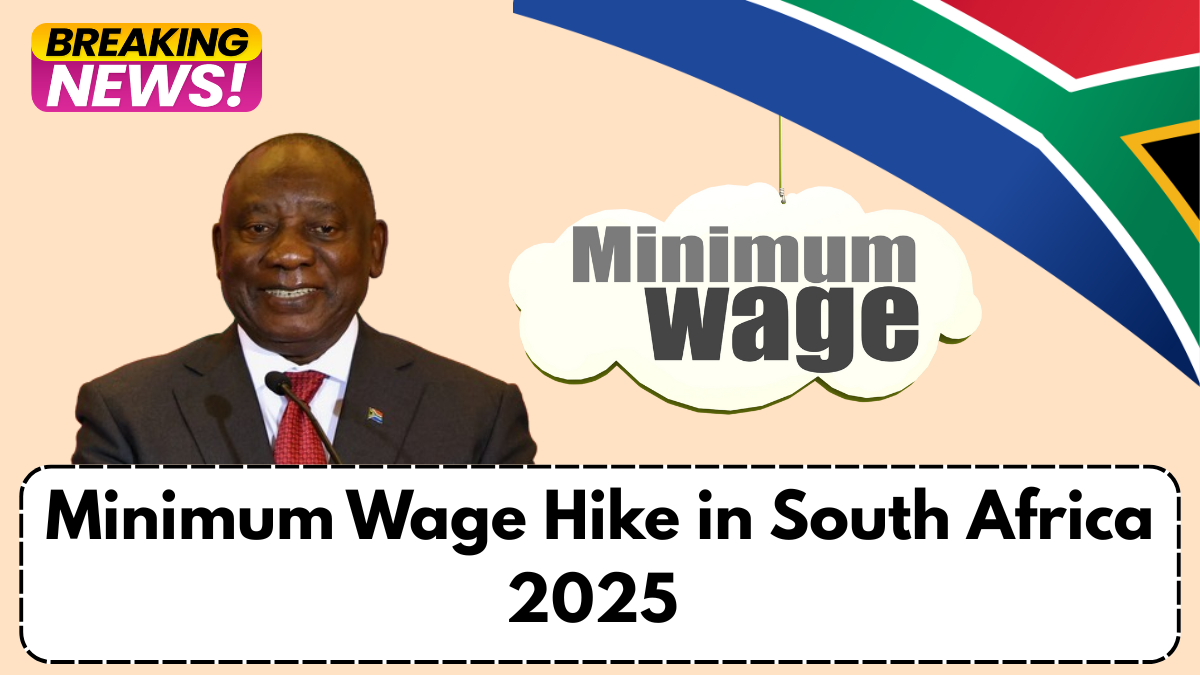In a major development aimed at ensuring economic fairness, the government has officially confirmed the Minimum Wage Increase South Africa for 2025. This long-awaited decision impacts various sectors, particularly vulnerable employees like domestic workers and farm labourers, who have historically been among the lowest-paid in the country. The updated wage structure brings renewed hope for millions who rely on daily and monthly wages to survive.
The Department of Employment and Labour announced this wage hike following extensive consultations with unions, employers, and civil society groups. As inflation and the cost of living continue to rise, the new minimum wage structure is seen as a crucial step in improving workers’ livelihoods. In 2025, fair pay is not just a policy goal—it’s a necessity.

What’s New in the 2025 Minimum Wage Structure?
The revised minimum wage will come into effect starting 1st March 2025, covering all sectors, with specific emphasis on domestic workers and farm labourers. The increase reflects the government’s broader commitment to reducing inequality and strengthening South Africa’s labour rights framework.
Here’s a summary of the updated wage rates:
| Category | 2024 Wage (per hour) | 2025 Wage (per hour) |
|---|---|---|
| General Workers | R25.42 | R27.00 |
| Domestic Workers | R23.19 | R25.10 |
| Farm Labourers | R23.19 | R25.10 |
| Expanded Public Works | R13.97 | R15.00 |
The Minimum Wage Increase South Africa applies uniformly across all provinces and sectors unless sectoral exemptions have been approved. The aim is to close the gap between standard and sectoral wage floors.
Why the Increase Matters for Domestic Workers and Farm Labourers
Domestic workers and farm labourers often work long hours with minimal benefits. These groups represent a significant portion of the informal and semi-formal workforce. With the new wage policy, workers in these categories will see an increase that translates into better food security, improved healthcare access, and educational support for their families.
The hike in wages is not just symbolic—it brings tangible benefits:
-
Monthly salaries will increase by approximately R300–R500 depending on hours worked
-
Access to higher credit limits and improved financial security
-
Legal leverage in disputes over underpayment
-
Greater job satisfaction and motivation
For farm labourers, this increase is crucial due to the seasonal nature of their employment, which often lacks long-term contracts or benefits. The government’s inclusive approach this year sets a strong tone for 2025.
Implementation Strategy and Employer Responsibilities
With the Minimum Wage Increase South Africa officially underway, employers must adjust their payroll systems accordingly. Failure to comply can result in penalties and legal repercussions under the Basic Conditions of Employment Act.
To support compliance, the Department of Labour has rolled out initiatives that include:
-
Employer awareness campaigns
-
Online wage calculators for fair remuneration planning
-
Hotline for underpaid workers to file complaints
-
Site inspections and random audits
The wage hike also encourages employers to enter formal employment contracts and maintain written job descriptions—steps that professionalize domestic and agricultural labour markets.
Challenges and Worker Expectations
While the increase is widely welcomed, challenges remain. Many small-scale farmers and private homeowners employing domestic workers are concerned about affordability. Still, the wage hike is non-negotiable, and various support measures are being explored to ease the transition.
Workers, on the other hand, hope this isn’t a one-time adjustment. They expect consistent, inflation-aligned updates in the future. Increased wages, when accompanied by fair working conditions and proper enforcement, could significantly reduce poverty and uplift the dignity of labour.
Conclusion
The Minimum Wage Increase South Africa for 2025 represents a firm move towards justice for the country’s most underpaid workers. For domestic workers and farm labourers, this change could redefine what it means to earn a living wage in South Africa. While enforcement and education remain critical, the new wage structure is a welcome and necessary development. As the labour market adapts, the goal is to make sure that every hour of honest work is rewarded fairly and legally.
FAQs
What is the new minimum wage for domestic workers in 2025?
The minimum wage for domestic workers has been increased to R25.10 per hour starting from 1st March 2025.
Are farm labourers included in the 2025 wage hike?
Yes, farm labourers will also receive R25.10 per hour under the new national minimum wage.
What happens if an employer doesn’t comply with the new wage rules?
Employers who fail to implement the Minimum Wage Increase South Africa may face legal action and fines as per labour laws.
Will the wage increase apply to all provinces?
Yes, the 2025 wage hike applies nationwide, unless sector-specific exemptions are granted by the Department of Labour.
Can employees report underpayment?
Absolutely. Workers can contact the Department of Labour’s hotline or visit a local office to report any cases of underpayment.
click here to learn more



